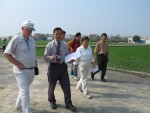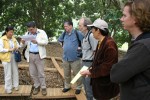Phase III of the International Workshop on Long Term Ecological Research in Agricultural Ecosystems took place in Taiwan from March 8-11, 2006. The event was organized by the Kellogg Biological Station (KBS) LTER and the Taiwan Ecological Research Network (TERN) and made possible through the support and cooperation of the US National Science Foundation (NSF), National Science Council (NSC) of Taiwan, the Taiwan Agricultural Research Institute (TARI), the Tainan District Agricultural Research and Extension Station (DARES), the Taiwan Forestry Research Institute (TFRI), National Taiwan University, and National Chung Hsing University.
The workshop’s objective was to introduce KBS scientists to the proposed sites and to consult with TERN investigators on the best ways to launch a new agricultural LTER site funded by the Taiwan Council of Agriculture (COA). The KBS advisory team of Phil Robertson, Stuart Gage, Dick Harwood, and Andrew Corbin was very impressed with the expertise and credentials of the scientists assembled to develop and run the agricultural LTER project. They agreed that the good mix of disciplines, high enthusiasm, and experienced and younger scientists in sync with an impressive array of field resources, could only contribute to the success of the project.
A one-day symposium involving KBS and TERN scientists was followed by visits to three proposed field sites in central Taiwan: a long-term high versus low-input Litchi (Lychee) orchard experiment at the Chia-Yi Research Station; and upland versus lowland rice paddy experiments at the Chi-Ko Branch Farm and the Yuin-Lin Experiment Station. The scientists then regrouped at Yuin-Lin for an in-depth discussion of the experimental design. Observing that the current design for the rice systems required more area than was available, unless the plot sizes became very small, the KBS researchers recommended an alternative experimental design consisting of high-input conventional (HIC) and low-input ecologically driven (ED) treatments. The HIC treatment would be based on standard agricultural practices, but the ED treatment could be a combination of both reduced tillage and reduced chemical subsidies. Chiu-Chung Young, Executive Director of the National Chung Hsing University Advisory Committee agreed that this could be a realistic approach. “Any observations made on the crop, soil, pest management, and soil amendments in these plots can be easily interpreted and transferred to the farmer through extension programs,” he said, noting that “new experimental designs and plots based on the present realistic farming conditions could simplify basic data collections from each plot.”
Commenting on the next steps to move this project forward, Dick Harwood noted that a collaborative effort by a potential core scientist group will be needed to design the field crop portion of the research at the two stations. He said, “A balance must be made between broadness of applicability (as in number of crops and rotations), and in selection of management types to represent high inputs versus an integrated, ecologically-based approach which looks to the future trends in reduced soil disturbance and enhancement of ecosystem services, both to the crops themselves and to the surrounding environment.”
Additional recommendations for the TERN group to consider were offered by the KBS team, most importantly:
- Incorporate agronomic experiments during the first few years of the study to show the best way to carry out low-input farming (e.g. ED).
- Develop a conceptual model, including a diagram of the system, to capture all important processes grouped under the major topic areas: nutrient availability, plant competition, consumers/pathogens, and modeling.
- Involve social scientists, particularly agricultural and resource economists, in the project.
- Develop an ecological approach to the study of population dynamics. Monitor predators, parasitoids, and plant pest species to help determine whether pests are under natural regulation, as they are likely to be under reduced inputs.
- Consider engaging the Taiwan sensor industry as a partner to test and deploy new types of sensor instrumentation to monitor important ecosystem driving variables in diverse landscapes.
The KBS team and a core group of TERN scientists and administrators later met Jen-Chyuan Lee, the Deputy Minister of the Taiwan Council of Agriculture, in Taipei and briefed him on the progress of the new LTER project. Acknowledging the importance of the effort, Minister Lee assured the participants of COA’s continued cooperation and support.
For information on the first two phases of this project, see The Network Newsletter Vol. 18 No. 1 Spring 2005, and Vol. 16 No. 1 Spring 2003.
The author wishes to thank Chi-Ling Chen and Chau-Chin Lin for coordinating this effort and their incredible hospitality.

 Enlarge this image
Enlarge this image

